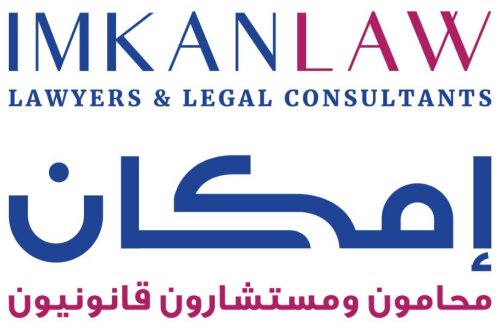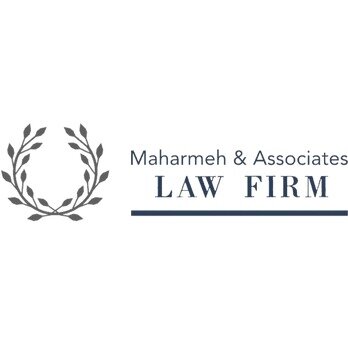Best Public-Private Partnerships (PPP) Lawyers in Hashemite Kingdom of Jordan
Share your needs with us, get contacted by law firms.
Free. Takes 2 min.
Or refine your search by selecting a city:
List of the best lawyers in Hashemite Kingdom of Jordan
About Public-Private Partnerships (PPP) Law in Hashemite Kingdom of Jordan
Public-Private Partnerships (PPP) are a strategic model where the public sector collaborates with private companies to develop, finance, and operate projects or deliver public services. In the Hashemite Kingdom of Jordan, PPPs have become increasingly important for infrastructure development in sectors such as energy, water, transport, and education. The legal framework for PPPs is designed to attract private investment, transfer knowledge, and share risks, all while ensuring public interests are protected. The primary legislation governing PPPs is the Public-Private Partnership Law No. 17 of 2020 and its subsequent regulations, which outline the processes, requirements, and protections for both public and private participants.
Why You May Need a Lawyer
Engaging in a PPP project involves navigating complex legal and regulatory processes. Here are some common situations where legal advice is crucial:
- Understanding eligibility and qualification criteria for PPP contracts
- Reviewing and negotiating PPP agreements and associated contracts
- Complying with local licensing, environmental, and regulatory approvals
- Navigating government procurement or tender procedures
- Managing disputes with public entities or consortium partners
- Advising on tax, customs, and investment incentives under Jordanian law
- Ensuring the protection of intellectual property and proprietary technologies
- Securing project financing or structuring joint ventures
- Assisting in project handover or termination scenarios
Given the significant financial stakes and regulatory obligations, skilled legal counsel helps protect your interests and ensures compliance throughout a PPP project.
Local Laws Overview
Jordan’s PPP legal framework is primarily shaped by Public-Private Partnership Law No. 17 of 2020 and its executive regulations. Key aspects of local PPP laws include:
- PPP Council: A dedicated council overseeing the assessment, approval, and monitoring of PPP projects.
- Bidding and Procurement: Transparent, competitive bidding processes with clear qualification standards for private entities.
- Contract Structure: Detailed requirements on project durations, risk-sharing mechanisms, performance standards, and government support provisions.
- Dispute Resolution: Mechanisms for resolving disputes, including potential recourse to courts or arbitration.
- Local Content and Labor Provisions: Incentives for employing local labor and sourcing materials from within Jordan when feasible.
- Investment Rights: Guarantees for private investor rights, repatriation of profits, and protection against arbitrary expropriation.
- Environmental and Social Compliance: Requirements to satisfy national environmental standards and stakeholder engagement processes.
These laws seek to balance attractive investment conditions for the private sector with strong protection of the public interest.
Frequently Asked Questions
What types of projects are typically developed under PPPs in Jordan?
PPPs in Jordan are commonly used for infrastructure projects in sectors such as energy (especially renewable energy), water treatment and supply, transportation (such as airports and roads), schools, and hospitals.
How are PPP contracts awarded in Jordan?
PPP contracts are usually awarded through a transparent, competitive procurement process. This may involve prequalification, request for proposals, and bid evaluation, overseen by the PPP Council.
What is the minimum duration for a PPP contract in Jordan?
There is no set minimum duration. The term of a PPP contract is determined based on the project's nature, investment recovery period, and risk-sharing arrangements, but they often range from 10 to 30 years.
Are foreign companies eligible to participate in PPPs in Jordan?
Yes, foreign companies can participate, either directly or through joint ventures with local firms, provided they meet the qualification requirements established by law and the specific project tender.
Who is responsible for financing PPP projects?
Financing typically comes from the private partner, possibly supplemented by government support or international financial institutions. The precise structure varies by project.
What government support is available for PPP projects?
Support can include the provision of land, guarantees, co-financing, tax exemptions, or other incentives, depending on each project's specifics and its importance to national development goals.
Can disputes arising from PPP contracts be resolved through arbitration?
Yes, many PPP contracts in Jordan include arbitration clauses, enabling disputes to be referred to domestic or international arbitration, subject to agreement by the parties and Jordanian law.
What are the key stages of a PPP project lifecycle in Jordan?
The main phases are project identification and selection, feasibility study, procurement and bid evaluation, contract negotiation, construction and implementation, and ongoing operation and maintenance.
Is there public consultation or stakeholder engagement for PPP projects?
Yes, for large infrastructure projects, there are requirements for environmental and social impact assessment, which include public disclosures and opportunities for stakeholder engagement.
What happens when the PPP contract expires or is terminated?
Upon contract expiry or termination, the project is typically handed over to the public party in accordance with agreed conditions. The contract outlines asset transfer, compensation, and other closure procedures.
Additional Resources
If you are considering involvement in a PPP project in the Hashemite Kingdom of Jordan, the following resources may be helpful:
- Ministry of Investment: Oversees investments and coordinates with the PPP Council.
- Ministry of Finance: Involvement in project financing and fiscal planning for PPP projects.
- PPP Council: The central body responsible for PPP project approval and oversight.
- Ministry of Public Works and Housing: Frequently involved in infrastructure and construction-related PPPs.
- Jordan Investment Fund: Provides information on major national projects and investment opportunities.
- Jordan Chamber of Commerce: For information on local partnerships and commercial regulations.
- Law firms specializing in PPP and infrastructure law in Jordan.
Consulting these entities early in your planning process can help clarify requirements and identify suitable legal advisors.
Next Steps
If you are seeking legal advice regarding a Public-Private Partnership in Jordan, consider the following steps:
- Clearly define your project goals, role, and expectations in the PPP arrangement.
- Gather all relevant documentation, such as tender materials, project proposals, and correspondence with public entities.
- Research local legal requirements and recent changes in legislation relevant to your sector.
- Identify reputable law firms or legal consultants experienced in PPP matters in Jordan.
- Schedule an initial consultation to discuss your needs, project specifics, and potential legal hurdles.
- Stay informed about public notices or updates from the PPP Council and relevant ministries.
Engaging skilled legal professionals early can help preempt common pitfalls, safeguard your investment, and ensure smooth project execution from initiation through completion.
Lawzana helps you find the best lawyers and law firms in Hashemite Kingdom of Jordan through a curated and pre-screened list of qualified legal professionals. Our platform offers rankings and detailed profiles of attorneys and law firms, allowing you to compare based on practice areas, including Public-Private Partnerships (PPP), experience, and client feedback.
Each profile includes a description of the firm's areas of practice, client reviews, team members and partners, year of establishment, spoken languages, office locations, contact information, social media presence, and any published articles or resources. Most firms on our platform speak English and are experienced in both local and international legal matters.
Get a quote from top-rated law firms in Hashemite Kingdom of Jordan — quickly, securely, and without unnecessary hassle.
Disclaimer:
The information provided on this page is for general informational purposes only and does not constitute legal advice. While we strive to ensure the accuracy and relevance of the content, legal information may change over time, and interpretations of the law can vary. You should always consult with a qualified legal professional for advice specific to your situation.
We disclaim all liability for actions taken or not taken based on the content of this page. If you believe any information is incorrect or outdated, please contact us, and we will review and update it where appropriate.
Browse public-private partnerships (ppp) law firms by city in Hashemite Kingdom of Jordan
Refine your search by selecting a city.
















